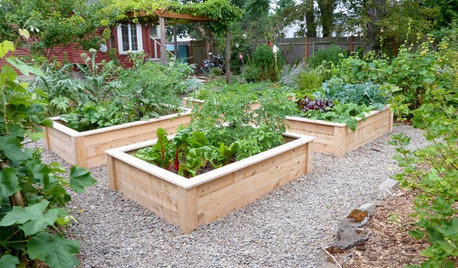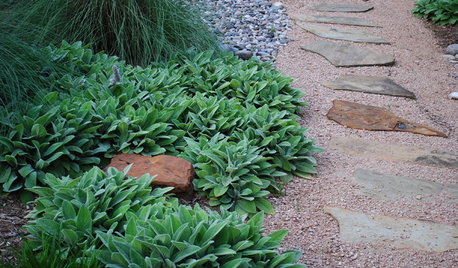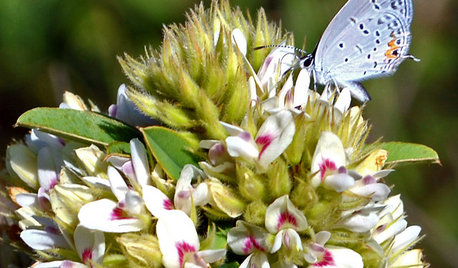Compost help: Finished compost is low in nitrogen?
monibucky
8 years ago
Featured Answer
Sort by:Oldest
Comments (51)
toxcrusadr
8 years agoglib
8 years agoRelated Discussions
Immature compost = Nitrogen Deficient?
Comments (18)My compost started out primarily with a base of chopped up sagebrush, various weeds and other vegetation trimmings. Regular feeds were primarily kitchen waste (fruits, veggies, breads) and garden trimmings, along with some cardboard or paper. I then started adding some dry dog food and UCG. I've gotten to the point where I realize that my bin is so carbon-heavy (I wasn't sure about the make-up of the sagebrush) that I add 99% kitchen greens and only the urine and faeces-laden browns I use to line my rats' home. But those changes are all newer than this batch. I'm going to stay nitrogen-heavy with the feeds until my nose tells me to up the carbons. I know it looks dry, but it really isn't. It's hard to keep balance here in NV. It seems like an extra 1/4 cup of water flips the pile from dry to sopping. I used the one batch as mulch (actually did till it in just a tiny bit into the earth because the earth was too hard), but didn't plan on using all my compost as mulch. In retrospect, it does seem as if the compost may not be suspect #1, but I assume you can understand why I'm a bit gun shy. I do consider compost to be, primarily, a supply of organic matter to my sterile NV sand/silt/clay "soil". I'm OK with that. What worried me is the idea that I was doing more harm than good! The site below does talk about how curing the compost is very important. Since my bin is continuous, it never gets to any final curing stage, and that's my fear. OK, so I'll ignore the results of the soil test. But what next? Just keep on keeping on, or make an adjustment to my system such as one of the three listed above? Thanks again for all the help. Here is a link that might be useful: CA on compost...See MoreCan low amb. temp. prevent compost heating up by adding Nitrogen?
Comments (23)From the Mantis web page "The Mantis ComposT-Twin dual-chamber composter holds almost 25 cubic feet of raw material" that's 10 bushels in each chamber!" 14 lbs X .29 is 4.06 lbs total Nitrogen that I added using just the lawn fertilizer. Compost density - Who knows? Assume it's 30% water, and the organic matter weighs almost nothing. The tumbler is now about half full, now that it settled about 50%. Water weighs 62.42 pounds/cubic foot. 62.42 X .3 X 25 X .5 is 234 lbs of compost, before the N was added. That means that I added 1.735% Nitrogen by weight. Or a 57.6:1 C:N ratio, ignoring any N from the Starbucks Coffee grounds I added much earlier. So from this simple math, my addition of the fertilizer does not seem to me to be out of line at all. In fact, had I done this calculation earlier, I ought to have added twice the fertilizer than I added! Thanks for indirectly suggesting that I do this simple math as a double-check on my "ongoing experiment". Jim Since the core temperature was only rising slowly, perhaps a degree F or two a day, today I added 4 lbs total of Urea. I've yet to do the math on that, but mentally I'm not out of line with this addition, since it's about twice as strong as the lawn fertilizer. Here is a link that might be useful: Mantis ComposT-Twin page...See MoreNewbie ques re worm composting to finish 'regular' compost output
Comments (4)Fast 'hot' composting requires a good mix of green (Nitrogen) and brown (Carbon) materials along with moisture and air. Fast hot compost can be finished as soon as 2-3 weeks. But if the mixture isn't right, you have cold compost which will break down in time, but may take a year or more. Now there's nothing wrong with cold compost - it's every bit as good as hot compost - it just takes longer...a lot longer. Vermicomposting is really a form of cold composting. Worms will process finished or near finished compost and it can make an excellent bedding material. However, it is important to also provide materials that are [more] actively decomposing to provide an ample feedstock. You 'can' purchase a COW, but you might want to begin with a simple rubbermaid/sterlite 10g or 18g bin. Your basement will be a bit cool at 50F as worms do best at 70F. They will be very slow, almost dormant at 50F, but they would be 'okay'. Also, as Bill points out, these won't really handle the volumes of material I think you're talking about. What you might better do is add worms to your outdoor compost heaps?...See MoreCompost - too much Nitrogen?
Comments (2)The nutrients in compost are not very readily available and that is what testing for nutrients finds, readily available nutrients. 8 pounds of N per yard sounds quite high since the chart linke3d says N is close to what would be normal at 1.5 percent or about 7.5 pounds N per 50 pounds of product. If this is an initial application of organic matter to the soil then a 2 inch thick application may not be too much, but if there is already some OM in the soil then that may be a bit much. You want a total of 6 to 8 percent OM in the soil. !/2 pound of Nitrogen over a 150 square foot space is not much and probably not really anything that is needed. Most every soil test I have seen in the last 50 plus years recommends adding these very small amounts of N simply because. I would be concerned about the pH of this compost. At a pH of 8 that is too high since most all compost I have worked with, and had tested, has been at a pH in the 6.0 to 7.0 range. kimmq is kimmsr...See Moremonibucky
8 years agoglib
8 years agokimmq
8 years agotoxcrusadr
8 years agogardengal48 (PNW Z8/9)
8 years agolast modified: 8 years agomonibucky
8 years agotete_a_tete
8 years agoRichard Brennan
8 years agomonibucky
8 years agoglib
8 years agokimmq
8 years agotoxcrusadr
8 years agoglib
8 years agokimmq
8 years agoglib
8 years agokokopellifivea
8 years agokimmq
8 years agojon2412
8 years agokimmq
8 years agolast modified: 8 years agosophie tucker
8 years agoJohn Donovan
8 years agolast modified: 8 years agoglib
8 years agokimmq
8 years agotoxcrusadr
8 years agooliverisaac
8 years agokimmq
8 years agocrmstrong
7 years agotoxcrusadr
7 years agocrmstrong
7 years agotoxcrusadr
7 years agolast modified: 7 years agocrmstrong
7 years agotoxcrusadr
7 years agolast modified: 7 years agoLloyd
7 years agorgreen48
7 years agocrmstrong
7 years agolast modified: 7 years agocrmstrong
7 years agoRichard Brennan
7 years agocrmstrong
7 years agoRichard Brennan
7 years agoLloyd
7 years agotheparsley
7 years agotoxcrusadr
7 years agotoxcrusadr
7 years ago
Related Stories

GARDENING GUIDESGet on a Composting Kick (Hello, Free Fertilizer!)
Quit shelling out for pricey substitutes that aren’t even as good. Here’s how to give your soil the best while lightening your trash load
Full Story
PRODUCT PICKSGuest Picks: Fall Entertaining Favorites
Make autumn feasts a piece of cake with chic compostable plates, pretty glasses, pie accessories and more
Full Story
KITCHEN DESIGNGreat Solutions for Low Kitchen Windowsills
Are high modern cabinets getting you down? One of these low-sill workarounds can help
Full Story
LANDSCAPE DESIGN7 Low-Maintenance Lawn Alternatives
Turf isn't the only ground cover in town. Get a lush no-grass lawn with clover, moss and other easy-care plants
Full Story
GARDENING GUIDES12 Tips to Help You Start an Edible Garden
Get on your way to growing your own vegetables with a raised bed or a few containers on the patio
Full Story
KITCHEN DESIGNGuest Picks: Organizing Your Kitchen for the New Year
Resolve to find a place for plastic bags, compost and piles of dishes to declutter your kitchen
Full Story
GARDENING GUIDESGreat Design Plant: Rosa Banksiae a Low-Maintenance Beauty
This thornless, disease- and insect-resistant rose brings showers of white or yellow flowers to the spring garden
Full Story
SAVING WATERLush Gardens With Low Water Needs
Drought tolerant doesn’t have mean spindly, brown and thorny
Full Story
GARDENING GUIDES5 Prairie Wildflowers That Can Heal Your Soil
Get free, organic soil fertilizer with nitrogen-pumping plants that draw pollinators too
Full Story
EARTH DAYThe Case for Losing the Traditional Lawn
Work less, help the environment and foster connections by just saying no to typical turf
Full Story



Richard Brennan